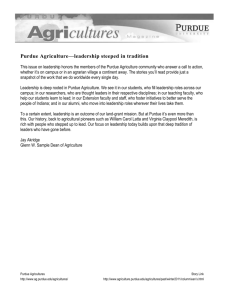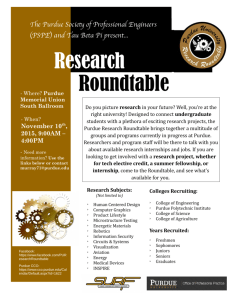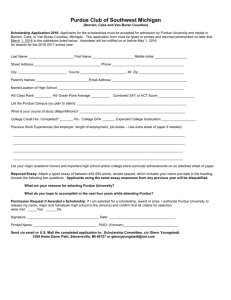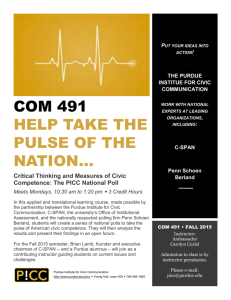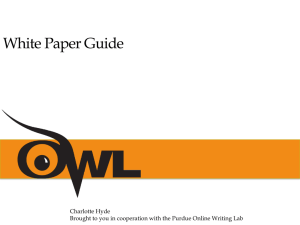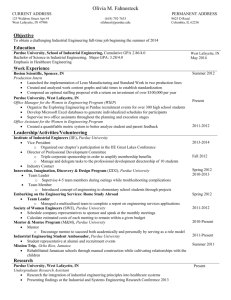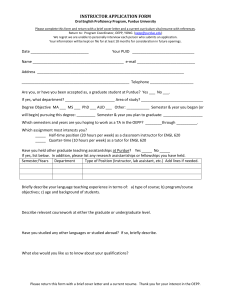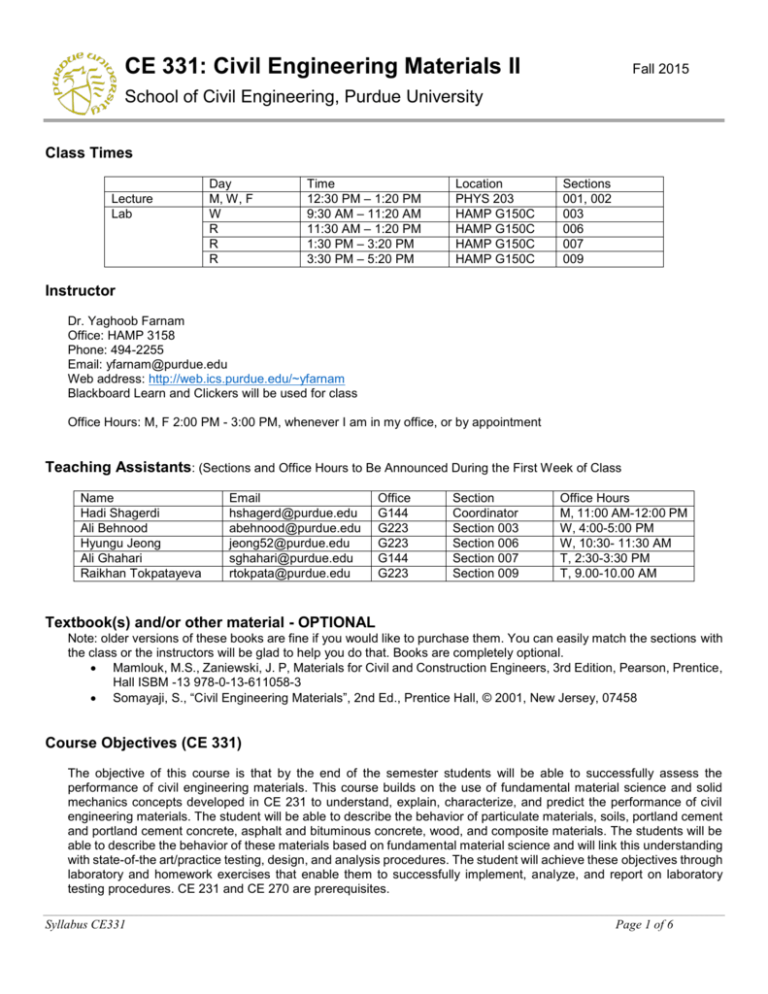
CE 331: Civil Engineering Materials II
Fall 2015
School of Civil Engineering, Purdue University
Class Times
Lecture
Lab
Day
M, W, F
W
R
R
R
Time
12:30 PM – 1:20 PM
9:30 AM – 11:20 AM
11:30 AM – 1:20 PM
1:30 PM – 3:20 PM
3:30 PM – 5:20 PM
Location
PHYS 203
HAMP G150C
HAMP G150C
HAMP G150C
HAMP G150C
Sections
001, 002
003
006
007
009
Instructor
Dr. Yaghoob Farnam
Office: HAMP 3158
Phone: 494-2255
Email: yfarnam@purdue.edu
Web address: http://web.ics.purdue.edu/~yfarnam
Blackboard Learn and Clickers will be used for class
Office Hours: M, F 2:00 PM - 3:00 PM, whenever I am in my office, or by appointment
Teaching Assistants: (Sections and Office Hours to Be Announced During the First Week of Class
Name
Hadi Shagerdi
Ali Behnood
Hyungu Jeong
Ali Ghahari
Raikhan Tokpatayeva
Email
hshagerd@purdue.edu
abehnood@purdue.edu
jeong52@purdue.edu
sghahari@purdue.edu
rtokpata@purdue.edu
Office
G144
G223
G223
G144
G223
Section
Coordinator
Section 003
Section 006
Section 007
Section 009
Office Hours
M, 11:00 AM-12:00 PM
W, 4:00-5:00 PM
W, 10:30- 11:30 AM
T, 2:30-3:30 PM
T, 9.00-10.00 AM
Textbook(s) and/or other material - OPTIONAL
Note: older versions of these books are fine if you would like to purchase them. You can easily match the sections with
the class or the instructors will be glad to help you do that. Books are completely optional.
Mamlouk, M.S., Zaniewski, J. P, Materials for Civil and Construction Engineers, 3rd Edition, Pearson, Prentice,
Hall ISBM -13 978-0-13-611058-3
Somayaji, S., “Civil Engineering Materials”, 2nd Ed., Prentice Hall, © 2001, New Jersey, 07458
Course Objectives (CE 331)
The objective of this course is that by the end of the semester students will be able to successfully assess the
performance of civil engineering materials. This course builds on the use of fundamental material science and solid
mechanics concepts developed in CE 231 to understand, explain, characterize, and predict the performance of civil
engineering materials. The student will be able to describe the behavior of particulate materials, soils, portland cement
and portland cement concrete, asphalt and bituminous concrete, wood, and composite materials. The students will be
able to describe the behavior of these materials based on fundamental material science and will link this understanding
with state-of-the art/practice testing, design, and analysis procedures. The student will achieve these objectives through
laboratory and homework exercises that enable them to successfully implement, analyze, and report on laboratory
testing procedures. CE 231 and CE 270 are prerequisites.
Syllabus CE331
Page 1 of 6
CE 331: Civil Engineering Materials II
Fall 2015
School of Civil Engineering, Purdue University
Course Description (CE 331)
A continuation of CE 231 but with an increased emphasis on engineering applications of civil engineering materials
such as portland cement concrete, bituminous materials/ asphalt cement concrete, polymers, composites, and wood.
In addition hands-on laboratory experiments are emphasized in this course.
ABET Outcome Criteria (CE 331)
a- an ability to apply knowledge of mathematics, science, and engineering
b- an ability to design and conduct experiments, as well as to analyze and interpret data
e- an ability to identify, formulate, and solve engineering problems
g- an ability to communicate effectively
Learning Objectives (CE 331)
To formulate equations that describe the properties of composite materials based on boundary conditions,
assumptions and constituent properties.
To use non-destructive tests to estimate material properties.
To use non-destructive tests to locate flaws in engineering systems.
To compare and contrast strength of materials and fracture mechanics solutions.
To use mathematics, science and engineering principles to estimate the influence of cracks on the mechanical
response of engineering materials
To use scientific and engineering principles to predict the elastic and viscoelastic response of a material.
To interpret engineering properties from test data.
To use standardized test procedures to describe the properties of engineering materials.
To use mathematical, scientific and engineering principles to compute the influence of material proportions on
the structure property relationships for concrete materials.
To utilize experimental data with scientific and engineering models to predict service life of concrete structures.
To be able to design the proportions for a concrete mixture.
To understand the relationship between the properties of an asphalt mixture and its performance.
To be able to select engineering materials for specific applications.
To communicate effectively using graphs.
To communicate effectively using an executive summary.
To communicate effectively using email.
To communicate effectively using an engineering report.
To communicate the expected accuracy obtained from engineering data.
GENERAL POLICIES AND RULES
Read these rules CAREFULLY. It will be assumed that you have read this material and understood it.
General Information
I will attempt to address questions received via emails. This works well for short questions however for descriptions
students are encouraged to attend office hours. I will attempt to respond to emails within one business day. I realize
your cell/smart phone is an important part of your life. I request that you try to remember to turn off the ringer to be
courteous to those around you. Should you need to attend to a call during class please quietly excuse yourself from the
room so that you can attend to your call. I will do my best to not text during class and ask you to do the same. You are
expected to come to class, to be prepared and to be ready to participate. Notes are provided in several forms on the
blackboard. I will make every attempt to post them at least 24 hours before lecture. You are allowed and encouraged
to print them prior to lecture. However if it helps you to take notes please do that and refer to the other notes as needed.
I expect to start and finish on time. I request that if you need to arrive late, step out during the lecture or leave early that
you do so in a way that is courteous to those around you.
Syllabus CE331
Page 2 of 6
CE 331: Civil Engineering Materials II
Fall 2015
School of Civil Engineering, Purdue University
Attendance
Students are expected to attend all classes, laboratory sessions, and examinations. Students are expected to be present
for every meeting of the classes in which they are enrolled. Students are expected to attend and actively participate in
weekly laboratory sessions, consisting of either problem solving sessions or running experiments. Labs will not be able
to be made up except in the case of EXTREME circumstances. When conflicts or absences can be anticipated, such
as for many University sponsored activities and religious observations, the student should inform the instructor of the
situation as far in advance as possible. Only an instructor can excuse a student from a course requirement or
responsibility. If you have a forseeable conflict please contact Dr. Farnam WELL BEFORE the scheduled lab and
possible options can be discussed. For unanticipated or emergency absences when advance notification to an instructor
is not possible, the student should contact the instructor as soon as possible by email, or by contacting the main office
that offers the course. When the student is unable to make direct contact with the instructor and is unable to leave word
with the instructor’s department because of circumstances beyond the student’s control, and in cases of bereavement,
the student or the student’s representative should contact the Office of the Dean of Students. Purdue University
recognizes that a time of bereavement is very difficult for a student. The University therefore provides the following
rights to students facing the loss of a family member through the Grief Absence Policy for Students (GAPS). GAPS
Policy: Students will be excused for funeral leave and given the opportunity to earn equivalent credit and to demonstrate
evidence of meeting the learning outcomes for missed assignments or assessments in the event of the death of a
member of the student’s family.
The link to the complete policy and implications can be found at:
http://www.purdue.edu/odos/services/classabsence.php.
A link to information on adverse weather procedures and announcements
http://www.purdue.edu/newsroom/health_safety/2011/11130WinterWeather.pdf
A link to information on emergency preparedness is available here. You are expected to watch the safety videos
http://www.purdue.edu/newsroom/health_safety/2011/11130WinterWeather.pdf
Laboratory Reports/Homework
All homework is to be in a format that would be consistent with professional engineering practice. All homework is to be
submitted on either plain (i.e., unlined paper) or engineering paper with the problem worked only on one side of paper.
All the sheets should contain the students’ name, assignment number, division number (of the enrolled division) and
the problem number. In addition it is anticipated that the problem will contain a clear description of the problem including
what are the problem givens, nomenclature, and the unknowns. In addition a sketch of the problem is needed as well
as a free body diagram whenever applicable (straight-edges are to be used in constructing these diagrams). The
solution is to be worked in an organized manner with relevant calculations and notes as appropriate. The answer is to
be placed in a box at the end of the problem containing units. The details of your calculations must be shown for all
problems that involve calculations. A result may be graded as completely wrong if given without supporting calculations.
Any numerical result or answer that requires a unit is incorrect, and will be counted as such, if that unit is omitted or
given incorrectly. Example: 50 is not the same as 50 mph or 50 km/hr. Each problem is expected to begin on a new
page. You are expected to understand the concept of significant figures and to use the proper number of significant
figures in the final statement of your lab results. Finally, all pages are to be stapled together before submission. Failure
to follow these guidelines may result in loss of credit regardless of the correctness of the answer. These are due at the
beginning of the appropriate class meeting. No late homework will be accepted.
Lab reports are due one week after you perform the experiment or one week after you get all the data needed for the
report. These are due at the beginning of the appropriate class meeting. No late reports will be accepted. Students are
expected, even encouraged, to consult with one another on homework assignments and lab write-ups; however all work
submitted by the student is expected to be their own effort. If there is reason to believe that work has been copied from
another student, university regulations may be invoked as regards punitive action. Furthermore, the Professor reserves
the right to assign a failing grade for either the specific work or for the entire course. Solutions to the Homework/Lab
Reports will be posted 24 hours after the assignment is submitted. Problems will be graded for correctness or will be
checked for completeness, regardless of approach or solution at the discretion of the Instructor.
Syllabus CE331
Page 3 of 6
CE 331: Civil Engineering Materials II
Fall 2015
School of Civil Engineering, Purdue University
Exams
All exams are closed book, closed notes. Relevant formulas will be provided with the exam. Programmable calculators
are permitted, however grading will be based solely on the information shown on the exam sheet. For this reason all
necessary steps, figures, and calculations are to be shown in order to obtain credit. All work that you submit must be
strictly your own. If there is reason to believe that work has been copied or done in collaboration with another student,
university regulations may be invoked as regards punitive action. Instances of cheating during exams will result in full
loss of credit for that exam. Additional measures including the immediate failure of the course, may be applied at the
discretion of the instructor and/or University Staff.
Make-Up Exams
There will be NO MAKE UP EXAMS in this course. Any student absent from an exam will receive a score of "zero" for
the exam, unless the absence was related to a substantive personal or family health emergency. The dates of the
exams are indicated on the syllabus. Therefore, all travel plans associated within or outside the university functions
shall be made with this policy in mind (This includes the final). Any student missing an exam due to a substantive
personal or family health emergency shall provide a written letter from a physician or a recognized individual
authenticating the seriousness of the emergency and how it led to the student's absence from the exam. The letter
should state the specific reason for the absence and the date and duration of the incident. The letter shall include the
name, title, relationship to the student, address, and telephone number of the letters author. In such case, the instructor
reserves the right to accept or decline the excuse.
Grading
Exams (2 exams) 65%
Laboratory Quizzes and Reports 15%
Homework and Quizzes 15%
Participation 5%
In order to pass the course, a 100 actual exam points (out of a total 200 points) is required. Failure to accumulate that
minimum number of actual exam points will result in an F grade, regardless of the overall average computed from all
completed assignments.
The course is NOT graded on a CURVE. Final letter grades are assigned based on the total number of percentage
points accumulated. These percentage points are weighted so that the approximate breakdown looks as follows: As a
guide, letter grades will generally be assigned as follows: Total percentage in the 90’s- A, 80’s- B, 70’s- C, 60’s- D,
below 60’s- F; providing that you have accumulated the minimum number of points needed for passing the course (150).
You are welcome to discuss any grade with Dr. Farnam. It is important that this is done within 72 hours of when the
graded work is returned. There will be no general review of prior work to find "extra points" toward the end of the
semester. You are free to contest laboratory, homework, or exam grades; however this must be done in writing and
submitted in person to Dr. Farnam. This written explanation should include the location of the problem you are
requesting review for along with a where the error is believed to have occurred. The item in dispute must be submitted
within 72 hours following the return of the homework, lab assignment, or lecture.
Good grades are earned by students who 1) attend and participate in class, 2) attend and participate in laboratories, 3)
perform the assigned reading, 4) perform the assigned homework, 5) understand the fundamental concepts and
objectives presented in class.
General Information on Academic Integrity
Academic integrity is expected of all students at all times.
Purdue prohibits "dishonesty in connection with any University activity. Cheating, plagiarism, or knowingly furnishing
false information to the University are examples of dishonesty." [Part 5, Section III-B-2-a, University Regulations]
Furthermore, the University Senate has stipulated that "the commitment of acts of cheating, lying, and deceit in any of
Syllabus CE331
Page 4 of 6
CE 331: Civil Engineering Materials II
Fall 2015
School of Civil Engineering, Purdue University
their diverse forms (such as the use of substitutes for taking examinations, the use of illegal cribs, plagiarism, and
copying during examinations) is dishonest and must not be tolerated. Moreover, knowingly to aid and abet, directly or
indirectly, other parties in committing dishonest acts is in itself dishonest." [University Senate Document 72-18,
December 15, 1972]
Information on what constitutes academic integrity may be found in the Purdue's student guide for academic integrity
(http://www.purdue.edu/odos/aboutodos/academicintegrity.php )
Use of Copyrighted Materials
Among the materials that may be protected by copyright law are the lectures, notes, and other material presented in
class or as part of the course. Always assume the materials presented by an instructor are protected by copyright unless
the instructor has stated otherwise. Students enrolled in, and authorized visitors to, Purdue University courses are
permitted to take notes, which they may use for individual/group study or for other non-commercial purposes reasonably
arising from enrollment in the course or the University generally.
Notes taken in class are, however, generally considered to be “derivative works” of the instructor’s presentations and
materials, and they are thus subject to the instructor’s copyright in such presentations and materials. No individual is
permitted to sell or otherwise barter notes, either to other students or to any commercial concern, for a course without
the express written permission of the course instructor. To obtain permission to sell or barter notes, the individual
wishing to sell or barter the notes must be registered in the course or must be an approved visitor to the class. Course
instructors may choose to grant or not grant such permission at their own discretion, and may require a review of the
notes prior to their being sold or bartered. If they do grant such permission, they may revoke it at any time, if they so
choose.
Violent Behavior Policy
Purdue University is committed to providing a safe and secure campus environment for members of the university
community. Purdue strives to create an educational environment for students and a work environment for employees
that promote educational and career goals. Violent Behavior impedes such goals. Therefore, Violent Behavior is
prohibited in or on any University Facility or while participating in any university activity. See the following website for
additional information: http://www.purdue.edu/policies/pages/facilities_lands/i_2_3.shtml
Students with Disabilities
Purdue University is required to respond to the needs of the students with disabilities as outlined in both the
Rehabilitation Act of 1973 and the Americans with Disabilities Act of 1990 through the provision of auxiliary aids and
services that allow a student with a disability to fully access and participate in the programs, services, and activities at
Purdue University. If you have a disability that requires special academic accommodation, please make an appointment
to speak with me within the first three (3) weeks of the semester in order to discuss any adjustments. It is important that
we talk about this at the beginning of the semester. It is the student's responsibility to notify the Disability Resource
Center (http://www.purdue.edu/drc) of an impairment/condition that may require accommodations and/or classroom
modifications.
Emergency Communication
In the event of a major campus emergency, course requirements, deadlines and grading percentages are subject to
changes that may be necessitated by a revised semester calendar or other circumstances beyond the instructor’s
control. Relevant changes to this course will be posted onto the course website (Blackboard) or will be emailed to the
course email list. If you have information this can be obtained by contacting the instructors via email. You are expected
to read your @purdue.edu email on a frequent basis.
Syllabus CE331
Page 5 of 6
CE 331: Civil Engineering Materials II
Fall 2015
School of Civil Engineering, Purdue University
Week #
Week 1
Week 2
Week 3
Week 4
Week 5
Week 6
Week 7
Week 8
Week 9
Week 10
Week 11
Week 12
Week 13
Week 14
Week 15
Week 16
Week 17
Syllabus CE331
Date
August 24, 2015
August 26, 2015
August 28, 2015
~
August 31, 2015
September 2, 2015
September 4, 2015
~
September 7, 2015
September 9, 2015
September 11, 2015
~
September 14, 2015
September 16, 2015
September 18, 2015
~
September 21, 2015
September 23, 2015
September 25, 2015
~
September 28, 2015
September 30, 2015
October 2, 2015
~
October 5, 2015
October 7, 2015
October 9, 2015
~
October 12, 2015
October 14, 2015
October 16, 2015
~
October 19, 2015
October 21, 2015
October 23, 2015
~
October 26, 2015
October 28, 2015
October 30, 2015
~
November 2, 2015
November 4, 2015
November 6, 2015
~
November 9, 2015
November 11, 2015
November 13, 2015
~
November 16, 2015
November 18, 2015
November 20, 2015
~
November 23, 2015
November 25, 2015
November 27, 2015
~
November 30, 2015
December 2, 2015
December 4, 2015
~
December 7, 2015
December 9, 2015
December 11, 2015
~
Day
M
W
F
W, R
M
W
F
W, R
M
W
F
W, R
M
W
F
W, R
M
W
F
W, R
M
W
F
W, R
M
W
F
W, R
M
W
F
W, R
M
W
F
W, R
M
W
F
W, R
M
W
F
W, R
M
W
F
W, R
M
W
F
W, R
M
W
F
W, R
M
W
F
W, R
M
W
F
W, R
Lecture #
L1, L2
L3
L4
~
LP1
L5
LP2
Lab 1
Lecture Title
Introduction - Composite I
Composite II
Composite III
No lab
Lab Prep: Lab Safety and Fiber Reinforced Composite
Fracture Mechanics I
Lab Prep: Particulate Composites and NDT
Fiber Reinforced Composites
Labor Day - No Class
L6
Fracture Mechanics II
L7
Fracture Mechanics III
Lab 2
Particulate Composites and NDT
LP3
Lab Prep: Fracture Toughness Testing
L8
Brittle Strengthening/Mechanism
L9
Viscosity
Lab 3
Fracture Toughness Testing
LP4
Lab Prep: Creep in Polymers
L10
Viscoelasticity I
L11
Viscoelasticity II
Lab 4
Creep in Polymers
L12
Review and Questions
L13
Aggregates I
LP5
Lab Prep - Particle Size and Density
Lab 5
Lab Problem Session
~
Examination - In Class
L14
Aggregates II
LP6
Lab Prep - Concrete Sample Preparation, Calorimetry
Lab 6
Particle Size and Density
October Break - No Class
L15
Introduction to Concrete
L16
Cement and Supplemental Materials
Lab 7
Concrete Sample Preparation
L17
Hydration and Concrete Structure
L18
Concrete Proportions I
L19
Concrete Proportions II
Lab 8
Calorimetry
L20
Concrete - Mechanical Properties
L21
Concrete - Early-Age Properties
L22
Concrete - Durability
Lab 9
Concrete Testing
L23
Service-Life Prediction
L24
Internal Curing in Concrete
L25
Bituminous Materials
Lab 10
Concrete Problems
LP7
Lab Prep - Asphalt Sample Preparation
L26
Hot Mix Asphalt Construction
L27
Hot Mix Asphalt Volumetrics
Lab 11
Asphalt Sample Prepration
L28
Asphalt Concrete Performance I
L29
Asphalt Concrete Performance II
L30
Invited Speaker
Lab 12
Asphalt Sample Tesing
L31
Chemical Admixures
Thanksgiving - No Class
Thanksgiving - No Class
Thanksgiving - No Class
L32
Masonry
L33
Clay and Wood I
L34
Wood II
Lab 13
Lab Tour
L35
Review Session
~
Optional Review Session
~
Optional Review Session
~
No Lab
Final Exam, As Scheduled by the University
Page 6 of 6

